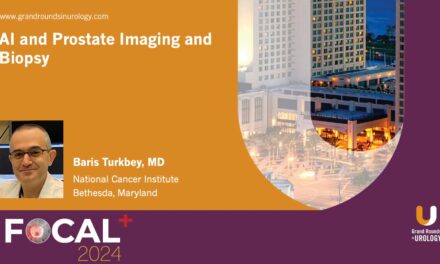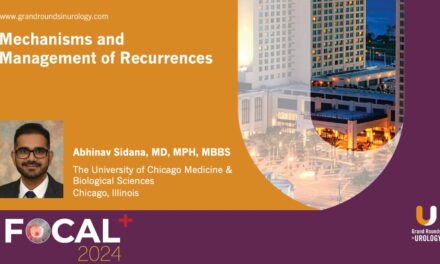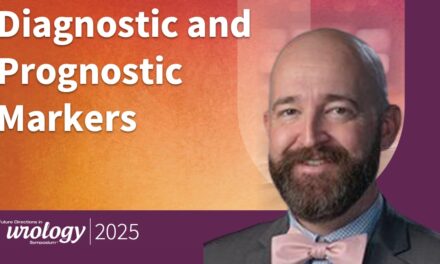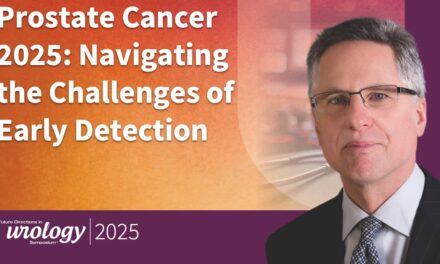Guilherme Godoy, MD, MS, presented “Prostate Biopsy Considerations – Transrectal vs. Perineal” at the 26th Annual Innovations in Urologic Practice on September 15th, 2022.
How to cite: Godoy, Guilherme. “Prostate Biopsy Considerations – Transrectal vs. Perineal” September 2022. Accessed Jan 2026. https://grandroundsinurology.com/prostate-biopsy-considerations-transrectal-vs-perineal/
Prostate Biopsy Considerations – Transrectal vs. Perineal – Summary#
Guilherme Godoy, MD, MS, Assistant Professor of Urology at the Baylor College of Medicine in Houston, Texas summarizes prostate cancer screening and explains that prostate biopsy is usually triggered by either an abnormal prostate-specific (PSA) or an abnormal digital rectal exam (DRE). He explains PSA is a very sensitive, but not a specific, biomarker and it leads to false positives and ultimately to overtreatment of disease. Dr. Godoy outlines the fundamental limitations of sampling biopsy, including undersampling, high rates of false negatives, missed lesions, issues related to repeated biopsies, and incorrect staging and risk stratification. He asserts the conversation has shifted from, “Who should be biopsied and when?” to “How should biopsies be done?” and “What is the best and safest method?” Dr. Godoy addresses multiparametric magnetic resonance imaging (mpMRI) as an essential component due to its precise targeting of lesions. Dr. Godoy outlines the arguments for and against transrectal and transperineal biopsies and points to a clinical trial, The PROFUS Trial. Dr. Godoy emphasizes how PROFUS showed the importance of targeted biopsies, concluding that MRI-guided, targeted biopsy tended to perform the best, especially with smaller lesions. Dr. Godoy then addresses the main driver of the transperineal resurgence, including a global concern over antimicrobial resistance, with transperineal biopsy-related infection rates <1 percent and negligible sepsis rates (0.1 percent). Dr. Godoy then introduces a systematic review and meta-analysis that shows the diagnostic accuracy of transperineal biopsy is comparable to that of transrectal biopsy. Other studies show that transperineal biopsy essentially eliminates infection risk and the need for prophylactic antibiotics. He addresses local anesthesia options and cost concerns, concluding that a combination of anesthesia choices is optimal. Dr. Godoy explains that transperineal prostate biopsy in the office setting under local anesthesia is becoming more feasible, citing a literature review on “free-hand” transperineal prostate biopsy under local anesthesia. Dr. Godoy then asks, “How can we do better?” and outlines some ways, including developing tools for infection risk assessment whereby a practitioner uses a selective approach based on individual risks that may include transrectal or transperineal prostate biopsy. Additionally, risk mitigation (e.g., targeted antibiotic prophylaxis) when using transrectal prostate biopsies can be helpful. He reviews the value of the transperineal approach in terms of safety and explains that as practitioners become more comfortable with the approach and the technology improves, it may become increasingly routine. Finally, Dr. Godoy emphasizes the importance of developing MRI technology to better select the need for biopsy, avoid unnecessary biopsies, eliminate the need for sampling (thus reducing the number of biopsy cores), and use MRI/ultrasound machine fusion with local anesthesia techniques.
About The 26th Annual Innovations in Urologic Practice:#
Presented by co-chairs Mohit Khera, MD, MBA, MPH, and Michael Coburn, MD, FACS, the Innovations in Urologic Practice conference provides a detailed review and commentary on multiple genitourinary and urologic diseases. Among the featured oncological topics are bladder cancer and immunotherapies, as well as upper tract cancer management, prostate cancer, including state-of-the-art imaging, focal therapy, and MRI. Experts also discuss new tools and techniques for nephrectomy and treating advanced renal cell carcinoma. In terms of general urological approaches, the conference also includes pelvic reconstruction and trauma; men’s health topics like male infertility, andrology, and sexual dysfunction; OAB and voiding dysfunctions; and ways to diagnose and treat infections in the urology patient.
For further educational activities from this conference, visit our collection page.
ABOUT THE AUTHOR
Guilherme Godoy, MD, MS, serves as assistant professor of urology at the Baylor College of Medicine (BCM) in Houston, Texas. He joined the faculty of the Scott Department of Urology at BCM in 2012 and has been the chief of the urology service at Ben Taub General Hospital (Harris Health System), since 2017.
Dr. Godoy earned his medical degree from Fundacao Universitaria do ABC in Sao Paulo, Brazil. His training includes an internship and residency in urology at Santa Casa De Sao Paulo in Vila Buarque, Brazil, and a fellowship in urologic oncology at BCM. Dr. Godoy has also completed urologic oncology fellowship training at Vancouver General Hospital, New York University, and Memorial Sloan-Kettering Cancer Center. He earned his MS in clinical investigations at BCM and has remained active in clinical research, translational studies, and clinical trials, mostly focused on prostate, urothelial (upper and lower urinary tract), and testicular cancers.
Dr. Godoy’s expertise includes early diagnosis, minimally invasive approaches (endoscopic and robotic), utilization of molecular and genetic tools for personalized decision-making, management of hereditary cancers, and surgical management of complex/large genitourinary (GU) tumors. His clinical areas of interest include adrenal and kidney tumors, urothelial cancers (upper and lower urinary tract including ureter, renal pelvis, bladder, and urethra), prostate cancer, penile cancer, and testicular and paratesticular cancers. Dr. Godoy also specializes in the utilization of intestinal segments for urinary tract reconstructions, and coordination of multidisciplinary approaches to manage complex intra-abdominal, retroperitoneal, and pelvic tumors. Dr. Godoy is responsible for and moderates the GU Tumor Board Meetings at Baylor St. Luke’s Medical Center as well as the St. Luke’s International GU Tumor Board Meetings.




